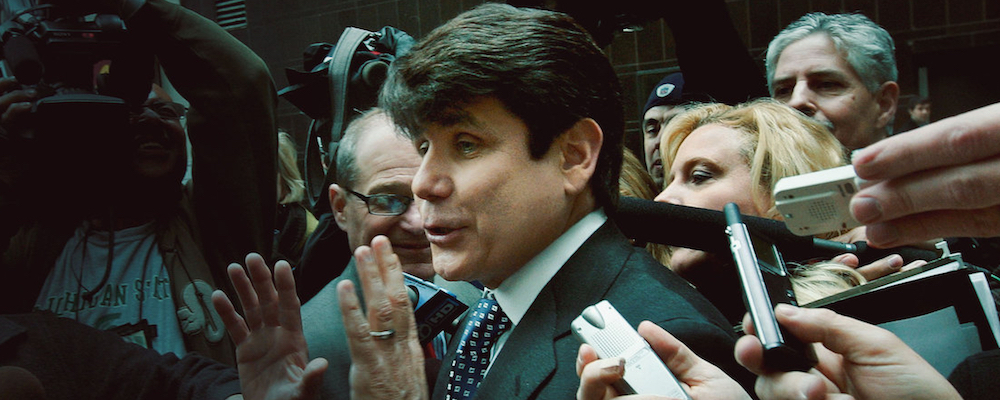‘Trial by Media’: Court TV Culture Is Explored in Gripping Netflix Docuseries
Sandra Miska
The role that press, public image, and other issues play in high-profile criminal cases is explored in “Trial by Media,” a six-part Netflix docuseries. Executive produced by George Clooney and Grant Heslov, each episode chronicles a different case that swept the nation, examining its lasting impact. Archival footage and extensive Interviews with lawyers, reporters, family members, associates, and some of the defendants themselves give perspective as viewers look back at these cases through a modern lens.
The first episode, “Talk Show Murder,” showcases the 1995 murder of Scott Amedure, a gay man who revealed his crush to an acquaintance, self-proclaimed heterosexual Jonathan Schmitz, on “The Jenny Jones Show.” Days after the taping, Schmitz shot and killed Amedure in his MI home. The subsequent media coverage focused on the role the “trashy” talk show had in the tragedy. During the criminal trial, Schmitz’s defense team made the case that their client, who was clinically depressed, was pushed over the edge after Amedure and the “Jenny Jones” team embarrassed him on national television. He was convicted of second-degree murder, but the real trial that turned into a media circus was the civil trial between the Amedure family and “The Jenny Jones Show.” Flamboyant attorney Geoffrey Fieger accused Jones and her producers of manipulating situations and exploiting guests, and much of the media coverage focused on how far is too far when it comes to talk shows.
Although the Amedure family won the case, the decision was reversed in an appeal, the argument being that “The Jenny Jones Show” was protected by free speech. At the time, much blame was placed on trash TV, but times have changed, and while in 1995 people generally accepted that being aggressively pursued by gay man was enough to push a depressed straight guy to murder, that would probably not fly today. The episode touches on, but does not go far enough in exploring the role internalized homophobia played in Schmitz’s motives, as some witnesses claimed that he had physical relations with Amedure between the time of the taping and the murder.
By the time of the Jenny Jones trial, CourtTV had been in session for several years, and the O.J. Simpson trial had revealed the entertainment value of sensational trials. But in 1984, it was still a novel idea, and the trial of four men accused of raping a women in a MA bar was the first one to be televisied “gavel to gavel.” This episode does an excellent job of exploring how this case was a watershed moment for how we as a society view rape, and the role “blaming the victim” played in letting perputrators go free.
“Subway Vigilante” and “41 Shots” tell of cases in which white men shot unarmed black men. In the first one, a man named Bernard Goetz shot four young men who approached him on a NYC subway 1984. While today such an act would immediately spark outrage, back then, when crime in the city was at an all-time high, many people identified with Goetz. A fascinating portrait is presented of a man with a God complex, and through his story we see how the media builds up “heroes,” often undeservedly.
“41 Shots” tells of the story of Amadou Diallo, an African immigrant who was gunned down in front of his NYC apartment building by four white cops. No episode is more emotional than this one, as it focuses heavily on Diallo’s mother, who recalls sending her son to the U.S. with high hopes. Both of these NYC episodes present a fairly nuanced exploration of media coverage of racially-charged protests and reactions to violent crimes and police brutality.
Compared to the other four installments of the series, “King Richard” and “Blago!” are relatively lighthearted, as the central figures are arrogant men who were charged with white-collar crimes. The former tells of Birmingham, AL businessman Richard Scushy, who was charged in 2003 with money laundering, fraud and other crimes. Here, we see the important role a charismatic lawyer plays in a trial, as Scushy rejected NYC and D.C. attorneys in favor of local representation who could relate to the Alabama jurors, and what transpired was a farcical trial, preceded by a successful attempt at rehabilitating Scushy’s image through a somewhat dubious religious conversion. It’s amusing to watch how the whole ordeal unfolded, as the story would be a fitting plot of a satire film.
Similarly, former IL governor Rod Blagoievich made the media rounds in order to make himself likable to a jury after he was charged with attempting to sell then-President Obama’s vacant senate seat, among other things. Unfortunately for Blago, he still ended up in prison. In 2019, after he has been locked up for seven years, we see how his devoted wife Patricia used the media to her own advantage. Although a Democrat, she appeared on Fox News pleading her husband’s case, knowing she would reach the one person who mattered, President Donald Trump, Rod’s former “boss” on “Celebrity Apprentice.” Trump commuted Blagoievich’s sentence in February 2020, a fitting conclusion to his saga and “Trial by Media.”
“Trial by Media” begins Streaming May 11 on Netflix.

